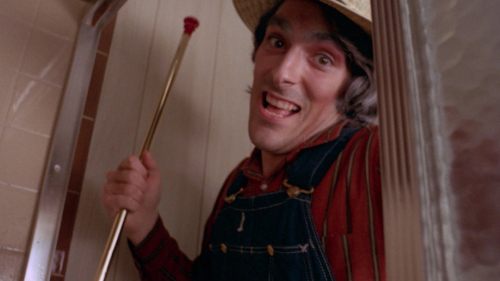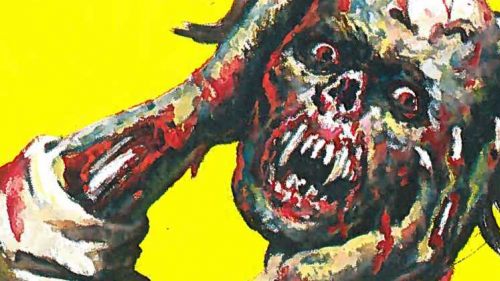The Amicus Vault Of Horror: ASYLUM (1972)
The most common images that crop up in one's head when discussing British horror are probably pulled from the infamous Hammer Films, where performers like Christopher Lee and Peter Cushing faced off against one another in gaudy, Gothic fables that re-worked Dracula and Frankenstein's Monster into short, cheap, garish delights. Those who enjoy the deeper cuts may picture scenes from the filmography of Pete Walker (Frightmare ['74]), whose '70s slashers were atmospheric cheapies, the English equivalent of Italian gore maestros like Lucio Fulci.
However, those who enjoy a mixture of both styles will probably be quick to quote the works of Amicus Studios - the brainchild of marginally-talented screenwriter/horror enthusiast Milton Subotsky, and a fast-talking New York carnival barker named Max J. Rosenberg. Together, they made their mint on the portmanteau picture: slices of anthology weirdness that borrowed actors from Hammer to produce chilling collections of modern morality tales.
These anthologies usually consisted of a series of interconnected segments, often adapted from the short stories of Psycho author Robert Bloch. They were given colorful titles like Dr. Terror's House of Horrors ('65, where rail passengers have ghastly Tarot cards read), Torture Garden ('67, where a sideshow attraction reveals individuals' darkest secrets), and The House That Dripped Blood ('71, where an investigator tries to solve four heinous crimes in one haunted home). Arguably the best of these omnibus-style horror shows was Asylum ('72) - a chilly trip to the titular madhouse, where young Doctor Martin (Ozploitation mainstay Robert Powell) is set to interview for a job. Only his academic pedigree doesn't impress would-be superior Dr. Rutherford (Patrick Magee). So, instead of the usual interview, Martin is sent off to four patients' rooms, one of which may be the recently committed head of the nuthouse. Should Martin be able to pick which one of them is the mad doctor based on their tales, he's got the position.
Recruiting career TV director Roy Ward Baker (The Saint) - who also directed The Vampire Lovers ('70) for Hammer - lends Asylum a rather claustrophobic feel, which kept it in line with Subotsky and Rosenberg's brand. Amicus productions brooded with the best of them; they were infinitely darker and less campier than their costume drama counterparts. Bloch's stories - which the author adapts himself in Asylum - are contemporary yarns revolving around mostly male madness, simplistic but wholly effective chillers that eschew the cheekiness of E.C. Comics' irony while still feeling right at home next to Amicus' own Tales From the Crypt ('72) and Vault of Horror ('73). While Subotsky famously damned his competition by saying "Hammer seems happy to make the same film over and over again", he and Rosenberg carved their own niche with this quickly familiarized format, and then extracted every last penny from it.
Asylum became one of Amicus' more disreputable titles, as Subotsky - who was a noted fan of the genre his company toiled away in - applied his love for violence and gore to Bloch's otherwise tame tales. The first interrogation (titled "Frozen Fear") finds a dissatisfied husband (Richard Todd) dismembering his wife (Sylvia Syms), only to have her wax paper-wrapped parts re-animate themselves and exact vegeance against him and his lover (Barbara Parkins). The second story ("The Weird Tailor") sees a struggling garment man (Barry Morse) receive a rather odd commission from a shadowy customer (Peter Cushing). The third legend ("Lucy Comes To Stay") revolves around an unstable woman (Charlotte Rampling) whose pretty alter ego (Britt Ekland) helps her commit murder against those lording over her own fate. None of these are overly deep - and the "psychological analysis" portion is merely an excuse for a wrap-around ("Mannikins of Horror") - but told with ruthless efficiency.
Like many of their movies, Asylum opened to generally awful reviews, but generated a huge profit. However, the economical means by which it was produced - shot in 25 days, with some actors (such as Herbert Lom) only working for a day or less - reflected the audience to whom they were sold. A recession had hit Britain during the '70s, and Amicus were offering up a collection of filmed stories with each of their titles, providing more picture pound for pound (if you'll forgive the pun). Asylum would be the first of seven movies Amicus would put out between '72 - '74, ending with the werewolf weird out, The Beast Must Die ('74). For reasons that remain unclear, Subotsky lost heart in Amicus in the wake of its biggest successes, and left the company in '75, only to level a lawsuit against his partners that would be dragged out until '80. But between those peak years, the company would leave one of the biggest footprints on horror (British or otherwise) as any entity in history.
Asylum is available now on Blu as part of Severin Films' Amicus Collection box set.




